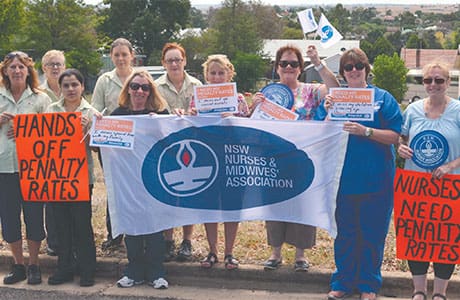Nurses and staff from the Murrumburrah-Harden District Hospital took part in a National Day of Action on the 4th of March with workers from around the country. The action was to protest against the Productivity Commission’s inquiry into the current Fair Work industrial relations laws that could reduce the provision and extent of penalty rates, which would particularly impact nursing staff.
The Productivity Commission has been given the task by the Federal Government “to examine the current operation of the Fair Work Laws and identify future options to improve the laws bearing in mind the need to ensure workers are protected and the need for business to be able to grow, prosper and employ.”
The terms of reference for the inquiry given to the Commission by Federal Treasurer Joe Hockey specifically identified, amongst other things: productivity, competitiveness and business investment; the ability of business and the labour market to respond appropriately to changing economic conditions; patterns of engagement in the labour market; the ability for employers to flexibly manage and engage with their employees; barriers to bargaining; industrial conflict and days lost due to industrial action; and appropriate scope for independent contracting.
The Fair Work Act of 2009 was passed by the then Labor government to replace the highly unpopular Work Place Amendment Act of 2005, otherwise known as ‘Work Choices’. Work Choices introduced individual contracts for workers (individual Australian Workplace Agreements), removed the ‘No Disadvantage’ test for workplace agreements, increased the restrictions on allowable industrial action, and scrapped unfair dismissal laws for businesses with less than 101 employees. Many commentators have pointed to Work Choices as a primary cause of the demise of the Howard Liberal Government in 2007.
For shift workers, the scope of the Productivity Commission’s inquiry has given rise to concerns that penalty rates may be impacted. This is especially significant to nurses and hospital staff.
“We are all nurses because we love it,” said Deb Fitzpatrick, President of the Harden-Murrumburrah Branch of the Nurses & Midwives Association. “But it does come at a cost to our families and our social lives.”
“Penalty rates are at least some form of compensation for these costs,” she added.
Currently, penalty rates are paid to workers who work evenings, nights, weekends or public holidays. NSW nurses get 12.5% loading for afternoon shifts, 15% for night shifts, Saturdays are 50% and Sunday is 75% loading.
“Cuts to penalty rates could mean a cut in take home pay by up to 30% for nurses and midwives working shifts,” said General Secretary of the NSW Nurses & Midwives Association, Brett Holmes.
There are even concerns that a cut to penalty rates would negatively affect the recruitment of staff into the nursing sector. “It’s hard enough as it is to get people into nursing as it is,” said Deb, “let alone without penalty rates.”
The Productivity Commission will release its draft report in July 2015, with the full report to be released in November 2015.
Murrumburrah Harden District Hospital staff campaign against the NSW Government’s attempt to reduce penalty rates. Pictured from left: Chris Harland, Lyn Peterson, Rajni Passi, Sally Dickson, Deb Fitzpatrick, Jenny Stewart, Barb Manwaring, Eleanor Ashton, Dianne Malone, Kellie Forsyth, Marg Schofield and Deepa Nair.

